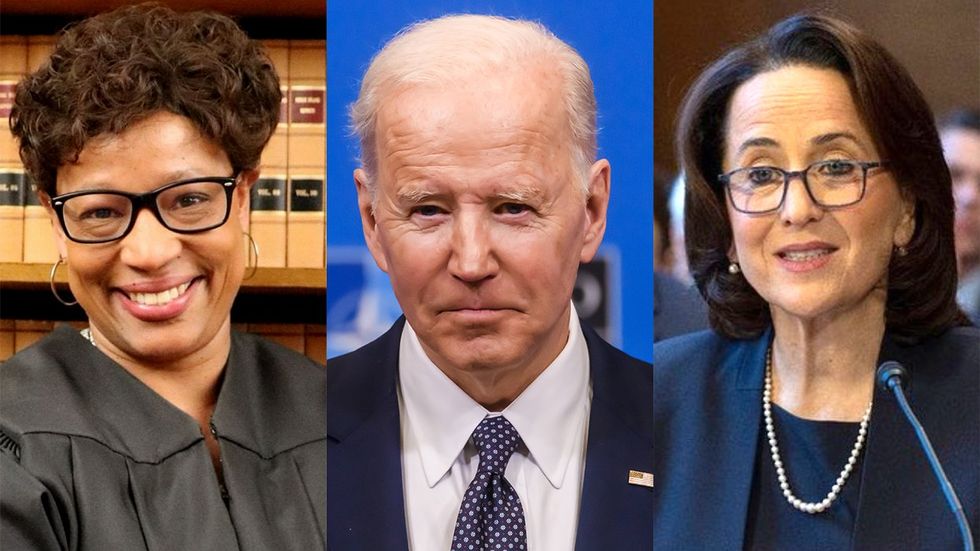Written by Nicole Chavez and Annette Choi
(CNN) — The confirmation of Nicole Berner and Melissa DuBose to the federal judiciary in recent weeks marksa watershed moment for bothLGBTQ+ representation and the Biden administration.
Eleven federal judges who identify as LGBTQ+, including Berner and DuBose, have been appointed and confirmed to lifetime positions since the beginning of the Biden administration, according to data analyzed by The Leadership Conference on Civil and Human Rights, a lobbying group.
That number tiesthe record set during the eight years of the Obama administration.
Civil rights advocates have continuously called for increased diversity on the federal bench to better reflect the country’s demographics, but the gap in representation for LGBTQ+ judges has been addressed only in the past 30 years.
Deborah A. Batts, the first known LGBTQ+ federal judge in the US, was appointed by former President Bill Clinton in 1994. Under the Trump administration, only two LGBTQ+ people were confirmed as federal judges.
“The vital work of building an equal justice judiciary that represents and works for all people in our nation must continue,” Lena Zwarensteyn, senior director of the fair courts program at The Leadership Conference, told CNN.
“We need more openly LGBTQ judges, including trans and non-binary judges — and we need judges from all of our communities who will respect the rights of all of us.”
Zwarensteyn said there’s much more to do to close the gap for the LGBTQ+ community in the federal judiciary.
There arenow23 LGBTQ+ judges on US federal courts, but there were 814 active federal judgeships as of March 12, according to a CNN analysis of Federal Judicial Center data.
While federal judges who identify as LGBTQ+ make up about 3 percent of the overall federal judiciary, a 2023 Gallup survey shows the percentage of adults who identified as LGBTQ+ in the US has more than doubled in the past decade to 7.6 percent of Americans.
Neither a transgender nor a nonbinary person has been nominated or confirmed for a lifetime federal judgeship in the US, according to The Leadership Conference on Civil and Human Rights.
Don Haider-Markel, a professor of political science at the University of Kansas and author of “Out and Running: Gay and Lesbian Candidates, Elections, and Policy Representation,” said while having LGBTQ+ judges doesn’t guarantee a certain outcome in court, judges from underrepresented communities bring their diverse experiences to the bench.
“We’ve seen these judges do have a pattern of decision-making that differs from the typical White, male decision-making we see out of judges,” Haider-Markel said.
“We would expect something similar from LGBTQ judges in that their decision-making will look different than the typical cisgender, White male,” he added.
The federal bench remains largely male and White. While the male-to-female ratio in the US is about even, men account for more than 60 percent of federal judgeships.
White people make up about three-fourths of the US population and two-thirds of the federal bench. Hispanic or Latino judges account for 11 percent of the federal judiciary, though 19 percent Americans are Hispanic or Latino. Black Americans make up 14 percent of the population and 16 percent of federal judges.
Upon DuBose’s confirmation, she became the 100th Black woman ever to receive a lifetime judicial appointment.
Maya Wiley, president and CEO of The Leadership Conference, said DuBose’s Senate confirmation matters because “Black women and openly LGBTQ people in our nation have long been underrepresented and excluded from service on our federal courts, and yet they come to federal courts to vindicate their rights.”
“It matters because this representation will inspire more Black women and more LGBTQ people to go to law school and seek to serve in such positions,” Wiley added.
The-CNN-Wire
™ & © 2024 Cable News Network, Inc., a Warner Bros. Discovery Company. All rights reserved.


















































































Fans thirsting over Chris Colfer's sexy new muscles for Coachella